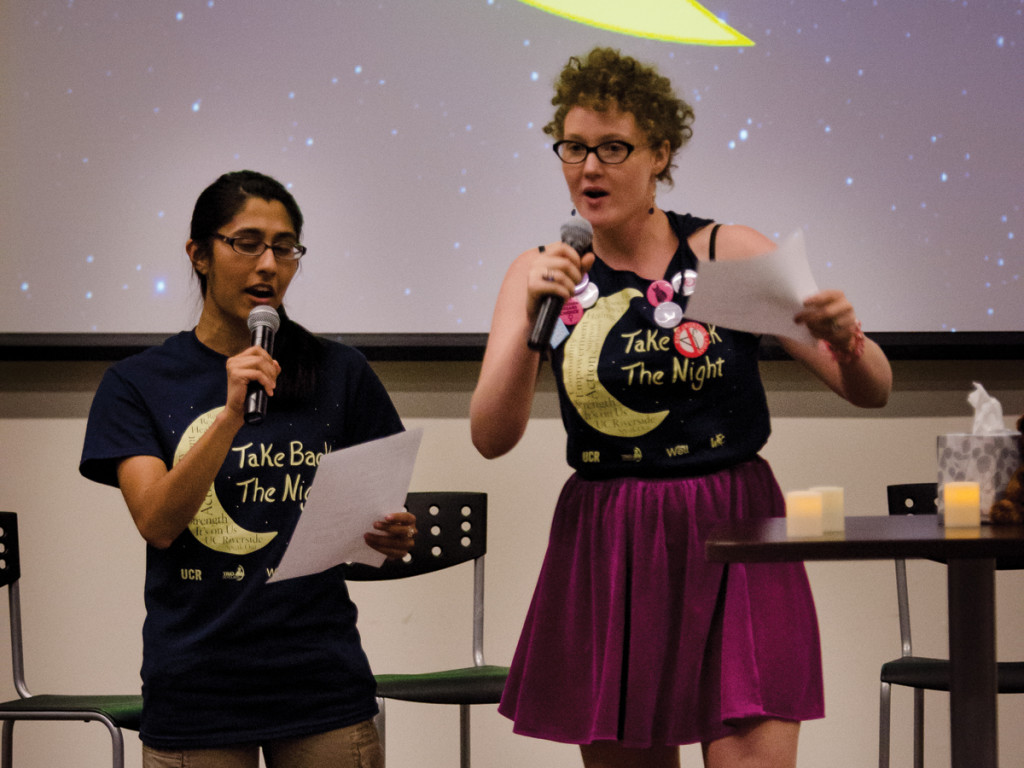
Sexual assault is one of those things that people don’t talk about in polite conversation. After all, the topic is heavy. It’s something that many people understand happens, but only in the abstract sense — a statistic here, a crime report there. For many, though, the reality of sexual assault is too real. It is for that reason that supporters of sexual assault survivors came to the Take Back the Night event last Thursday.
I knew the event was being held in HUB 302, but when I arrived outside, I assumed there must have been a mistake: Behind the closed double doors, the only light I could see was a dark, dim gloom. After watching a few shadows waver through the windows, though, I pushed through the doors and waited for my eyes to adjust to the twilight inside.
What I saw had the quietness and intimacy of a funeral reception. Small electric tea lights were placed at the edges of the tables and at the end of each row of chairs, each of them emitting a comforting glow that burned through the dusk. Small groups of people milled together, quietly speaking to one another, accompanied by calming waves of hushed music. A few others sat behind two sets of tables in a show of community (such as the LGBT Resource Center and Power of the Peers) stacked with informational pamphlets and messages of support, a set of four on either side of the room. Still others gathered near the table of food in the back of the room, while some attendees started sitting down alongside their friends in the rows of chairs provided.
Take Back the Night is a safe forum for sexual assault survivors to share their stories with supporters and other survivors. It is a place for people to learn about the resources available to them. It is for dispelling common myths about rape. But above all, it is about making sure the voices of survivors and supporters are heard.
“The name itself is so powerful. I like the idea of reclaiming the night, but it’s about empowerment,” said Lisa Yu, program coordinator for the Women’s Resource Center and one of the people who helped plan the event. “I think survivors … so many are silenced into not talking about what happened.”
Still, I couldn’t help but feel nervous. Everybody seemed to be getting along so well with each other, and I was invading their personal space. I felt as if I were an estranged twice-removed distant relative dropping in unannounced at a funeral. I didn’t know whether to continue.
A woman called out to me. She was sitting behind a table with a sign-in sheet, and began palming bunches of things — a program, a resource guide — into my hands. She reached into a box of T-shirts and asked me what size I was. I stuttered my response as I juggled all the things into one arm to pick up the pen and sign in. She smiled — not one of those department store fake smiles, but a genuine smile of happiness — and thanked me for coming. Perhaps it wouldn’t be so awkward after all.
People weren’t just eating and speaking with one another. Spread out on three tables were activities for survivors and allies to pledge their support to end sexual assault. At one table attendees crafted bouquets of roses. I sat down at the table where attendees were scrapbooking collages of images and words together. They were here to show support for an issue that is too frequently swept under the rug. “It’s a really big elephant in the room,” said Kasey Myers, a second-year history major. Gina Equihua, a fourth-year art major, agreed. “I just figured it was important for people to know about situations like this,” she said. “It’s taboo in society.”
Fourth-year media and cultural studies major Sarah Doyle picked up the microphone as attendees flocked to the rows of chairs. “We are gathered here to reclaim this space,” she announced, before breaking into a history of sexual assault and rattling off a nauseating set of statistics. 60 percent of people with disabilities are sexually assaulted. In two-thirds of all sexual assaults, the victim knows the assailant. One out of four college women are sexually assaulted. One out of 10 heterosexual men are sexually assaulted. 90 percent of assailants never go to jail.
“Take Back the Night is a way for us to integrate the things we want to do,” Associate Vice Chancellor of Diversity Yolanda Moses announced. She emphasized that sexual assault is not just an individual problem, calling workshops and training not enough, but a structural and institutional one. Not only do individuals need to take it upon themselves to stop rape from happening, but they also need to commit to changing the way people think about rape. “What we want to think about is how we value every single person’s experience on campus,” Moses said.
After both finished speaking, Doyle announced that survivors and supporters would have the opportunity to share their stories of sexual assault. At first, simply silence. Then, one by one, attendees started gliding up to the set of chairs at the front of the room. The stories began pouring out like water from a well.
Parts of their stories: He took my silence as consent. It feels like you’re out of your body, you’re shell-shocked. It was my own brother who told me it was my fault. You don’t want to feel like it’s real. I’ve never told anybody these details. You’re not by yourself.
All the while, every face in the room turned toward the speaker. When one person’s voice began to waver and crack as she spoke, an ally from the front row stood behind her, grasped her shoulder and patted her back. Her voice stabilized and she carried on. Another finished her story without a tear in her eye. But as she walked back, she broke down. A flock of supporters quickly wrapped her in a cloak of encouragement as they walked together down the middle aisle.
“They’re really strong and bold and courageous to speak out,” said Jai’Na Jones, a first-year undeclared student. “My mom, she goes through it. This is a symbol for her to get through it,” she said, motioning to a yellow shirt with the words “Love should not hurt” penned on it. Angelica Hic, a fourth-year sociology and women’s studies double-major, explained that the collage she was making was “just a reminder” of the things she had experienced. “I picked ‘tough,’” she announced, focusing her eyes on the piece of paper. “It’s a reminder that I am tough.”
The muted room was soon brought alive by chants of support. “Yes means yes, no means no! However we dress, wherever we go!” the entire group, together, announced in a single, rousing voice. It became clear that those who had survived sexual assault weren’t just victims — they and their supporters were empowered to make change, and can take back the night.








